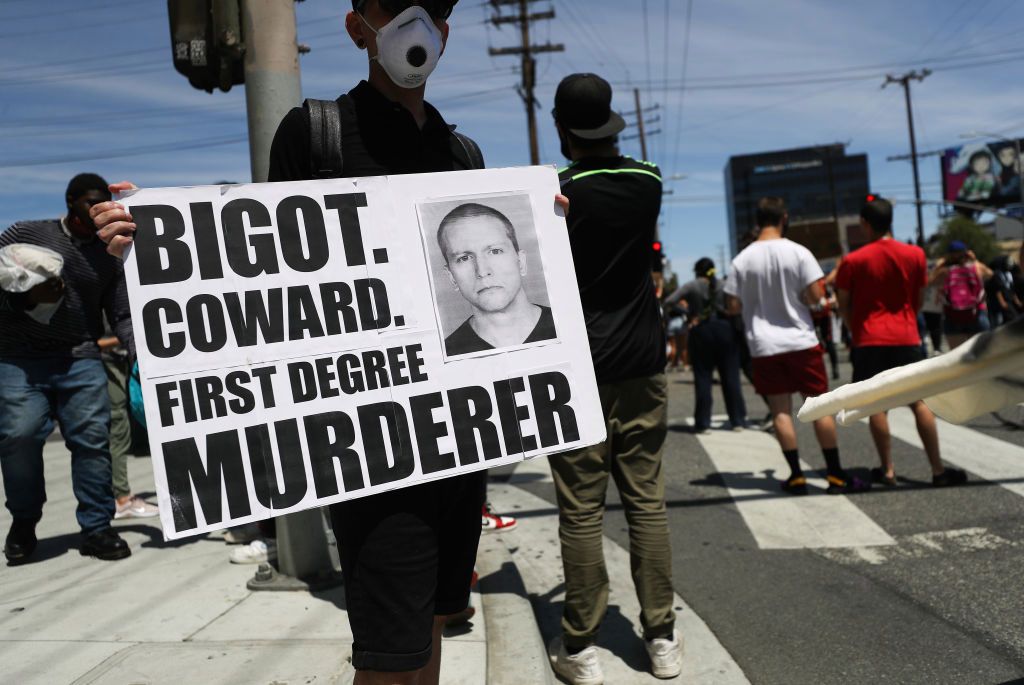Cop Accused Of Killing George Floyd Has History Of Using Brutal Neck Restraints, Other Victims Say

Source: Mario Tama / Getty
The fired police officer who kneeled on George Floyd‘s neck for nearly nine minutes has a history of employing the same kind of brutal neck restraints on other Black and brown suspects, people who claim to be past victims of former Minneapolis Police Officer Derek Chauvin told the New York Times in a new bombshell report.
The Minnesota Attorney General’s Office is hoping to introduce these claims as evidence of a pattern of Chauvin’s renegade style of policing that appeared to kill Floyd, who was handcuffed and face-down on a hot street’s pavement during the encounter that spurred ongoing nationwide protests against police violence, racism and what is often times the deadly combination of the two.
Chauvin, who is awaiting trial after being charged with one count of second-degree unintentional murder and one count of second-degree manslaughter for the preventable instance of police violence on Memorial Day, used his knee to apply pressure to people’s necks in at least six other arrests going back more than five years, the Times found.
Four of those people who were arrested are Black and brown, while the races of the other two were not included on the arrest reports.
Zoya Code, a Black mother, described her 2017 encounter with Chauvin and said she pleaded with him, “Don’t kill me.”
Chauvin’s response?
“He just stayed on my neck,” Code said. And then applied more pressure, she said, “Just to shut me up.”
One person who was accused of panhandling in Minneapolis told the Times that Chauvin went for his neck after he resisted being handcuffed.
“The next thing I felt was arms just wrapped around my neck,” Jimmy Bostic said. “I started telling him, ‘Let go, I’m having trouble breathing. I have asthma. I can’t breathe.’”
The Times details multiple other accounts from people who say Chauvin resorted to going for their necks.
In fact, over the course of a 19-year career in law enforcement, he was the subject of at least 22 complaints or internal reviews stemming from his use of force.
A judge ruled just last month that Chauvin will be tried separately from the other three former officers accused of aiding and abetting the alleged murder of Floyd.
Chauvin’s trial is scheduled to begin on March 8, according to a ruling by Hennepin County Judge Peter Cahill, who cited COVID-19 restrictions as a reason for separate the trials.
The other officers, Thomas Lane, J. Alexander Kueng and Tou Thao, who stood idly by as Chauvin kneeled on Floyd’s neck, will be tried together in August.
Minnesota Attorney General Keith Ellison said that holding separate trials could have harsh effects on family members and witnesses, forcing them to relieve the incident and subsequent aftermath more than once.
“We respectfully disagree with the court’s decision to sever three of the defendants from the other and its ruling on the timing of the trials,” Ellison said. “As we argued several months ago, and as the judge agreed in his November ruling, we believe all four defendants should be tried jointly.”
Chauvin faces up to 40 years in prison if he is found guilty.
SEE ALSO:
Derek Chauvin Faces Solo Trial In George Floyd’s Murder Case Due To COVID-19 Restrictions
Judge Upholds Derek Chauvin’s Most Serious Murder Charge As Other George Floyd Cops
[ione_media_gallery id=”3956574″ overlay=”true”]

